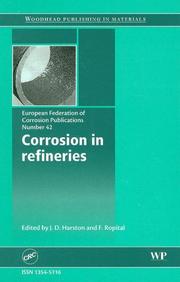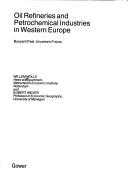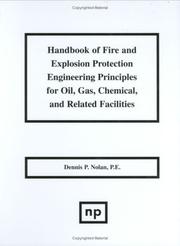| Listing 1 - 10 of 20 | << page >> |
Sort by
|
Book
ISBN: 0128030895 0128030887 9780128030899 9780128030882 Year: 2016 Publisher: Amsterdam, Netherlands : Gulf Professional Publishing,
Abstract | Keywords | Export | Availability | Bookmark
 Loading...
Loading...Choose an application
- Reference Manager
- EndNote
- RefWorks (Direct export to RefWorks)
Every oil and gas refinery or petrochemical plant requires sufficient utilities support in order to maintain a successful operation. A comprehensive utilities complex must exist to distribute feedstocks, discharge waste streams, and remains an integrated part of the refinery's infrastructure.
Petroleum refineries. --- Oil refineries --- Refineries, Oil --- Refineries, Petroleum --- Petroleum --- Refining
Book
ISBN: 9780128169957 0128169958 9780128169940 012816994X Year: 2020 Publisher: Cambridge, Massachusetts : Gulf Professional Publishing,
Abstract | Keywords | Export | Availability | Bookmark
 Loading...
Loading...Choose an application
- Reference Manager
- EndNote
- RefWorks (Direct export to RefWorks)
Petroleum refineries. --- Oil refineries --- Refineries, Oil --- Refineries, Petroleum --- Petroleum --- Refining

ISSN: 13545116 ISBN: 1845693248 1845692330 9781845693244 9781845692339 9781420054965 Year: 2007 Publisher: Cambridge, England Boca Raton, Florida
Abstract | Keywords | Export | Availability | Bookmark
 Loading...
Loading...Choose an application
- Reference Manager
- EndNote
- RefWorks (Direct export to RefWorks)
Corrosion in ageing refinery plant presents a serious safety hazard. This important book summarises key research into corrosion processes in refinery equipment, how it can be measured and controlled. The book reviews factors affecting corrosion such as carburisation and metal dusting as well as corrosion in steel and other materials used in refinery technology. It considers corrosion in a range of refinery equipment such as storage tanks, HF alkylation units, sour water strippers and insulated units. Other chapters discuss ways of testing for corrosion and cracking in refineries together with
Petroleum refineries --- Equipment and supplies --- Corrosion. --- Oil refineries --- Refineries, Oil --- Refineries, Petroleum --- Petroleum --- Refining
Book
ISBN: 1282955950 9786612955952 1437778585 1437778577 9781437778588 9781437778571 Year: 2011 Publisher: Burlington, MA Elsevier Inc.
Abstract | Keywords | Export | Availability | Bookmark
 Loading...
Loading...Choose an application
- Reference Manager
- EndNote
- RefWorks (Direct export to RefWorks)
The security and economic stability of many nations and multinational oil and chemical companies is highly dependent on the safe and uninterrupted operation of their oil, gas and chemical facilities. Fire and explosion incidents are among the most critical impacts than can occur to these operations. This book provides a reference guide for professionals involved with fire and explosion prevention and protection aspects of these critical facilities. The main objectives of this handbook are to provide a practical understanding of fire and explosion problems at oil, gas and chemical fac
Chemical plants --- Explosions --- Explosions. --- Petroleum refineries --- Fires and fire prevention. --- Safety measures. --- Oil refineries --- Refineries, Oil --- Refineries, Petroleum --- Chemical works --- Petroleum --- Accidents --- Chemical engineering --- Factories --- Refining
Book
ISBN: 0833095250 0833094122 9780833095251 9780833094124 Year: 2016 Publisher: RAND Corporation
Abstract | Keywords | Export | Availability | Bookmark
 Loading...
Loading...Choose an application
- Reference Manager
- EndNote
- RefWorks (Direct export to RefWorks)
Petroleum refineries --- Gas manufacture and works --- Safety measures --- Law and legislation --- Producer gas --- Gas --- Oil refineries --- Refineries, Oil --- Refineries, Petroleum --- Petroleum --- Refining

Abstract | Keywords | Export | Availability | Bookmark
 Loading...
Loading...Choose an application
- Reference Manager
- EndNote
- RefWorks (Direct export to RefWorks)
Petroleum chemicals industry --- Petroleum industry and trade --- Petroleum refineries --- Oil refineries --- Refineries, Oil --- Refineries, Petroleum --- Petroleum --- Petrochemical industry --- Chemical industry --- Refining --- Industrial economics --- Western Europe
Book
ISBN: 0814762395 9780814762394 9780814762615 0814762611 9780814762370 0814762379 9780814762387 0814762387 Year: 2013 Publisher: New York : New York University Press,
Abstract | Keywords | Export | Availability | Bookmark
 Loading...
Loading...Choose an application
- Reference Manager
- EndNote
- RefWorks (Direct export to RefWorks)
Winner of the 2015 Rachel Carson Prize presented by the Society for Social Studies of Science Residents of a small Louisiana town were sure that the oil refinery next door was making them sick. As part of a campaign demanding relocation away from the refinery, they collected scientific data to prove it. Their campaign ended with a settlement agreement that addressed many of their grievances—but not concerns about their health. Yet, instead of continuing to collect data, residents began to let refinery scientists' assertions that their operations did not harm them stand without challenge. What makes a community move so suddenly from actively challenging to apparently accepting experts' authority? Refining Expertise argues that the answer lies in the way that refinery scientists and engineers defined themselves as experts. Rather than claiming to be infallible, they began to portray themselves as responsible—committed to operating safely and to contributing to the well-being of the community. The volume shows that by grounding their claims to responsibility in influential ideas from the larger culture about what makes good citizens, nice communities, and moral companies, refinery scientists made it much harder for residents to challenge their expertise and thus re-established their authority over scientific questions related to the refinery's health and environmental effects. Gwen Ottinger here shows how industrial facilities' current approaches to dealing with concerned communities—approaches which leave much room for negotiation while shielding industry's environmental and health claims from critique—effectively undermine not only individual grassroots campaigns but also environmental justice activism and far-reaching efforts to democratize science. This work drives home the need for both activists and politically engaged scholars to reconfigure their own activities in response, in order to advance community health and robust scientific knowledge about it.
Petroleum industry and trade --- Social responsibility of business --- Environmental responsibility --- Petroleum refineries --- Oil refineries --- Refineries, Oil --- Refineries, Petroleum --- Petroleum --- Environmental aspects --- Refining

ISBN: 1591240840 9781591240846 9780815513940 0815513941 9780815517511 0815517513 0815515383 9780815515388 9781601194084 1601194080 9780815517504 0815517505 1282253174 9781282253179 6612002654 9786612002656 0080947344 9780080947341 0815517521 9786612253171 0080946313 9786612737688 1282737686 1282002686 9786612002687 Year: 1996 Publisher: Westwood, N.J. : Noyes Publications,
Abstract | Keywords | Export | Availability | Bookmark
 Loading...
Loading...Choose an application
- Reference Manager
- EndNote
- RefWorks (Direct export to RefWorks)
The security and economic stability of many nations and multinational oil companies are highly dependent on the safe and uninterrupted operation of their oil, gas and chemical facilities. One of the most critical impacts that can occur to these operations are fires and explosions from accidental or political incidents. This publication is intended as a general engineering handbook and reference guideline for those personnel involved with fire and explosion protection aspects of critical hydrocarbon facilities. Design guidelines and specifications of major, small and independent oil companies a
Chemical plants --- Petroleum refineries --- Explosions. --- Accidents --- Oil refineries --- Refineries, Oil --- Refineries, Petroleum --- Petroleum --- Chemical works --- Chemical engineering --- Factories --- Fires and fire prevention. --- Refining
Book
ISBN: 9282755762 9789282755761 Year: 1996 Publisher: Luxembourg EUR-OP
Abstract | Keywords | Export | Availability | Bookmark
 Loading...
Loading...Choose an application
- Reference Manager
- EndNote
- RefWorks (Direct export to RefWorks)
Water supply. Water treatment. Water pollution --- European Union --- Petroleum refineries --- Environmental policy --- Water --- Pétrole --- Environnement --- Eau --- Environmental aspects --- Pollution --- Raffineries --- Aspect de l'environnement --- Politique gouvernementale --- -Water --- -Hydrology --- Oil refineries --- Refineries, Oil --- Refineries, Petroleum --- Petroleum --- -Pollution --- -Refining --- -Environmental aspects --- -Petroleum refineries --- -Oil refineries --- Pétrole --- Hydrology --- Refining --- Petroleum refineries - Environmental aspects - European Union countries --- Water - Pollution - European Union countries

ISBN: 0872012867 Year: 1973 Publisher: Houston Gulf
Abstract | Keywords | Export | Availability | Bookmark
 Loading...
Loading...Choose an application
- Reference Manager
- EndNote
- RefWorks (Direct export to RefWorks)
614.84 --- Petroleum refineries --- -Oil refineries --- Refineries, Oil --- Refineries, Petroleum --- Petroleum --- Fire hazards. Fires and firefighting. Protection against fire --- Fires and fire prevention --- Refining --- Fires and fire prevention. --- -Fire hazards. Fires and firefighting. Protection against fire --- 614.84 Fire hazards. Fires and firefighting. Protection against fire --- -614.84 Fire hazards. Fires and firefighting. Protection against fire --- Oil refineries --- -Fires and fire prevention
| Listing 1 - 10 of 20 | << page >> |
Sort by
|

 Search
Search Feedback
Feedback About UniCat
About UniCat  Help
Help News
News